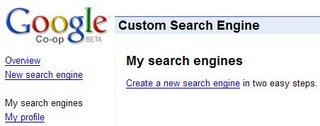I am as enthusiastic as anyone about the potential for vertical search. I will admit that part of this excitement comes from the thought of being able to successfully challenge the big general search engines on their own turf. More important, however, is that this is the type of information product that really plays to our strengths as masters of our vertical niche markets. The key, of course, is that we’ve got to get the execution right.
Unfortunately, I sense that the attraction of vertical search to some B2B publishers is that it looks simple and cheap. Get some search software (heck, Google will even license you theirs), index some stuff, and presto, you are a giant in vertical search. The reality is that you can and must do a lot more than that. Here are some thoughts on what characteristics your vertical search offering should have if you really want to be a contender in the world of search:
1) A well-developed strategy for identifying what third-party sites you are going to index.
2) A serious taxonomy. Aggregating web-based information is not at all challenging these days. The action, skill and the value are in providing simple, fast and intelligent access to this information.
3) Feature your own content.
4) Go beyond the open web. To me, this is critical. In B2B, the best and most important information is generally not free. That’s why it’s all the more important that you include it in your search engine. It’s huge differentiation, and can become a meaningful revenue stream.
GlobalSpec got this right early in the game with its Engineering Search Engine.
5) Don’t forget reference information. Offer industry-specific calculators, tables, reference data, formulas, etc. Artfully blending links with evergreen destination content really increases your value to users and builds quality, repeat traffic.
6) Summarize, annotate, analyze, critique. Everyone is suffering from information overload. Even your highly tailored vertical search product is likely to return more results than the average user can possibly review.
7) Rate, rank, recommend. If you think some sites are better than others, say so, right in the search results. It’s incredibly valuable to users.
8) Add directory content. Whether it’s a simple name and address lookup or a sophisticated product search, a lot of B2B users are on the web looking for companies and product information.
9) From their search engine to yours. For B2B publishers to survive and thrive, we’ve got to think in terms of two-tier search where users “discover” specialized search offerings through general search engines.
10) Dare to be different. It’s okay to start out as a vertical clone of the big search engines, but as you gain experience and confidence in your vertical search offering, your real success will come from blazing new trails, since differentiation from the big players is what in the longer term will help you both survive and thrive. As long as your innovations are driven by real user needs, you’ll never go too far wrong, and you are highly likely to innovate your way to even greater success.

